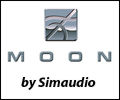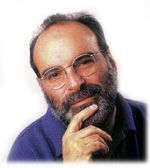
In This eNewsletter:
• From the Editor's Desk, Shows and CDs, by John Atkinson
• Shows and CD Piracy, by Ken Kessler
 |
| September 28, 2006
In This eNewsletter: |
 Shows and CDs, by John Atkinson Shows and CDs, by John Atkinson
Fall is the season for Audio Shows. Following the policy that started with our coverage of the 2006 Consumer Electronics Show last January, we are reporting live from Shows on our website, as they happen, rather than publishing a report in the paper magazine, which, due to the long lead-time required by the print media, might not appear until four months after the last Showgoer has found his weary way home. We reported from our own Home Entertainment 2006, held at the end of May and this month's coverage from CEDIA and the two rival UK Shows—see Ken Kessler's contribution to this newsletter below the fold—can be found here and here. Our next live report will be from the Rocky Mountain Audio Fest, being held October 20–22 in Denver, Colorado. In the final entry from our Home Entertainment 2006 coverage, we reported that we were planning for our 2007 Show to take place in Chicago. Best laid plans, and all that. For various reasons, the Windy City idea fell through and Home Entertainment 2007, sponsored by Stereophile, Home Theater, and Shutterbug magazines, and UltimateAVmag.com, will now be held in Manhattan, at the glitzy Grand Hyatt Hotel adjacent to Grand Central Station May 11-13, 2007. "New York is a great location for this event," says Greg Nivens, the event's director. "The central Manhattan location makes the show easily available to world press, high-end AV enthusiasts, industry insiders and manufacturers. After polling our participants they constantly tell us that they like this show in NYC." The show will offer more than 100 demonstration rooms where participants can meet with the over 300 participating manufacturers. The show will also offer a series of informative seminars and a program of live music events. (Stay tuned for more info at www.homeentertainment-expo.com.) In the first September eNewsletter, I announced the launch of the new e-commerce page at www.stereophile.com, which is based on a customer-friendly shopping-basket engine. Which is as good a way as any of announcing the next recordings that will be offered the magazine's readers. I wrote in the May issue of Stereophile about my new CD of Robert Silverman performing Beethoven's monumental work for solo piano, the Diabelli Variations (STPH017-2), which I recorded with Ray Kimber's IsoMike array in the summer of 2004. After a series of unforeseen delays, this CD—recorded and mastered with 24-bit resolution—will be available Monday October 1. Price will be $16.95, but if you also purchase Robert Silverman's out-of-print 1980s recording of the two Rachmaninoff Piano Sonatas (OrpheumMasters KSP802), the price for the two CDs will be $24.95 (plus S&H). This Rachmaninoff set has long been a favorite of mine, particularly the "Faust" Sonata (No.1 in d), of which the reviewer for Fanfare magazine wrote: "Silverman's performance is a gradually expanding one. His shaping of the multiple elements that structure the first movement is impeccable. The deeply resonant sound of the piano enhances its great drama. But wait till you get to the unspeakably beautiful Lento. Few pianists can float treble melodies as sensitively as Silverman can. I've heard no other pianist play this movement with such consummate poignance. The tone bespeaks regret and loss, but it is also phenomenally gorgeous. The sound of the recording is spacious and full. Certainly, this recording must be included in the top two or three outstanding renditions I have ever heard." We only have a limited stock of this Rachmaninoff CD, so it will be first-come, first-served. Go straight to http://ssl.blueearth.net/primedia/home.php next Monday, do not pass Go, get a little credit-card action, to be followed soon thereafter by musical satisfaction. Two weeks later, we will be offering a new CD from Minnesotan male-voice choir Cantus. I recorded There Lies the Home in Sioux Falls, South Dakota, in June 2005, and I believe this collection of songs for choir, solo voice and piano, and choir accompanied by cello, guitar and piano, is the band's best yet in terms of both sound quality and performance. As Wes Phillips writes in his article on the making of the CD, scheduled to appear in the December issue of Stereophile, "Sometime in 2004, it occurred to Cantus that one of the profound wellsprings of male choral singing was the great age of sail. Cantus had within its repertory a whole, um, boatload of material that sprang from the sea, ranging from sea chanteys to a thrilling tour of the Finnish Kalevala courtesy of [contemporary Estonian composer] Veljo Tormis. As artistic director Erick Lichte recalls it, 'We realized that we had the bare bones of a great thematic collection, especially since we were getting spectacular response from Veljo Tormis' Muistse mere laulud [Songs of the Ancient Sea], so we thought we could make a really good recording of sea songs—especially when we were able to commission 'A True Heart Is Waiting' from Minnesotan composer Edie Hill, which gave us the point of view of the lover left waiting at home for the wanderer to return. That's when we knew we had a whole concept and not just an idea.'" The highlights for me of this CD are an imaginative arrangement of Sting's "Valparaiso" (from his Mercury Falling album), the five Songs of the Sea by the under-rated English composer Charles Stanford, and the above-mentioned "A True Heart Is Waiting" by Edie Hill, who graced the recording sessions with her presence. But my favorite memory of the sessions is lining up the Mayor of Sioux Falls and other civic dignitaries around the walls of the Great Hall at the Washington Pavilion of the Arts and Sciences and recording them whistling to represent the sounds of the drowned in Tormis' 1996 work, Incantatio maris aestuosi. And at the end of the year, we will be releasing Nathaniel Rosen's awesome performance of J.S. Bach's Suites for Solo Cello. Originally released as a 2-CD set on John Marks Records, this was our "Recording of the Month" for November 1994, and, according to Stereophile reviewer Les Berkley, "The microphone positioning here sounds well-nigh perfect—there is a marvelous balance between instrument and room," while then-music editor Richard Lehnert commented "Nathaniel Rosen packs more space and time into these bare-bones pieces than anyone I've ever heard. My new favorite recording." Produced by Doris Stevenson and engineered by Jerry Bruck, this set has long been a favorite of mine, but is also long out-of-print. We have licensed the rights from John Marks to re-release this set on the Stereophile label. I'll keep you posted on its availability. |
 |
Simaudio Ltd. Simaudio Ltd., celebrating 25 years of excellence, manufactures state-of-the-art components for both 2-channel and home-theater systems. Maintaining a world-class reputation, we continually push the performance envelope to the next level with each new product. Visit us at www.simaudio.com. |
||||
 Shows and CD Piracy, by Ken Kessler Shows and CD Piracy, by Ken Kessler
Within days of my writing this the season's hi-fi shows will have begun, and it's already shaped up as a period of conflicts minor and major. Take the first pairing, the CEDIA Expo and TOP Audio Milano. The Custom Electronic Design & Installation Association chose to move its event back by a couple of weeks, after a number of years at the beginning of September. This year the Expo clashed with Italy's TOP Audio, which, after Munich and Berlin, is probably the best-attended show in Europe. American manufacturers who would have attended both had to choose between them. The choice must have be painful for those manufacturers with feet in both camps: high-end audio-only gear and home theater/custom installation. It's a shame that CEDIA—which has size and juice enough to swat away other shows like flies—possesses such insensitivity. Hell, it probably doesn't even know TOP Audio exists. But for those of us who attend these shows for business purposes, it's an unwelcome development. What had become a global season of minimal date clashes, at least in the US and Europe, was now one of difficult choices. The other primary clash of international import is the Munich Show vs Stereophile's Home Entertainment 2007, due to the German show's dates being connected to a floating national holiday whose dates can vary by as much as a month. The collision is not due to malice or to one show's ignorance of the other, just an unfortunate byproduct of national holidays (eg, Easter) that aren't fixed to hard dates (eg, Christmas or July 4). Even more unfortunate was the fracas that erupted in the UK. Founded by Stereophile's editor, John Atkinson, over 23 years ago, Hi-Fi News' annual event used to be the premier London hi-fi show. Aside from a truly miserable hiatus in a French-owned hotel in the city, it has always been held at Heathrow Airport—advantageous for European visitors, who could come in just for the day. For some years now, though, HFN has been allowing the show's direction and identity to drift. Now, having blinked for too long, the magazine found itself facing a rival show on the same day, across the road from the Heathrow Renaissance Hotel—see http://blog.stereophile.com/hifinews2006. As was expected, this has split the beleaguered UK audio industry. As one who has always felt contempt for outboarders, I was outraged by the sheer chutzpah of the exhibitors at the rival event, the London Sound & Vision Show '06: having basically flipped off HFN, they still expected the magazine's contributors to cover the competing show. What they fail to see is a delicious irony: Like the relationship of T.H.E. Show to the Consumer Electronics Show, the rival event's existence depends entirely on visitors attracted to the "real" show. Because I was a part of the HFN show organization, I will say no more: I don't need to fend off accusations of bias or conflicts of interest. Suffice it to say that I am mortified that the situation happened in the first place, at a time when the UK high-end audio market is, verily, in the toilet. Troubles are also affecting the software side, and for a reason many of us overlook: CD piracy. With last year's figures now available, UK record companies have demanded stronger action on CD piracy, citing 37 million pirated discs sold last year. As it's done for decades, the British Phonographic Industry (BPI) says intellectual property crime should be "higher on the police's agenda"—a tough call in a country where speeding warrants closer investigation than rape or burglary. According to the BPI's figures, CD piracy cost the industry �165 million in lost revenues in 2005, or nearly 10% of total sales. They found that much of the contraband was sold through car-trunk sales and markets, which accounted for over a third of the pirated CDs, "while a quarter were bought from friends." What's a real ear-opener is the thought that the total value of the pirated discs was more than the combined legitimate sales of the top 13 albums in the UK! Combating CD piracy will be tricky—and a political hot potato at a time when the UK government again and again proves itself incapable of doing anything about crime. In a society in which criminals' rights are more important than victims', it's unlikely that Blair & Co. will shed any tears for multinational record labels. Almost poignantly, given the likelihood of success, BPI spokesman Matt Phillips feels that owners of markets where counterfeits are sold should be prosecuted, while the BPI wants stricter financial penalties for the counterfeiters themselves. While I desperately wanted to avoid raising the subject again, your much-loved Apple continues to find itself in court. This time, it's another one in the eye for those who believe that Apple is the 21st-century corporate manifestation of Leonardo Da Vinci, and that I am lower on the food chain than a pederast for not being a Mac-off. No, I'm not referring to the recall of all those notebook batteries, which were made by Sony and also affected Dell, but the news that Apple must now pay Creative Technology $100 million. This long-running dispute concerns Creative's patent on its hierarchical menu system for navigating a music collection. Creative introduced their system in 2000, more than a year before Apple launched the iPod. This is only Apple being true to form, in my opinion. Briefly, Apple Computer and Creative Technology have agreed to settle their dispute—which has fed countless lawyers since January 2005—over music-player patents. For its $100 million, Apple receives a license to Creative's patent for the user interface first found in that company's Zen music players. Apple's CEO, Steve Jobs, is reported to have said, dryly, that "Creative is very fortunate to have been granted this early patent." For those of you who worship at the bitten-Apple altar, the price of Creative Technology shares rose 37% when the news hit, while Apple's fell 3�, to $67.28, "after extended trading." I can't wait to see what happens when Microsoft's Zune digital media player arrives later this year. Add to the mix Universal's SpiralFrog service, the free-music rival to iTunes, and you can expect to see a few hundred articles—in the UK financial pages, at least—headlined "Apple Crumble." |
| Subscribe to our other eNewsletters: UltimateAV, Home Theater, Shutterbug |
| To unsubscribe, simply reply to this email with the word 'unsubscribe' in the subject or body of the email. |
| Subscribe To This Newsletter • Stereophile Home Page |
| Print & Web Media Kit • Privacy • Contact Us • Letters to the Editor |
| Subscribe to Stereophile Magazine |
| Copyright © Primedia Magazines, Inc. All rights reserved. |